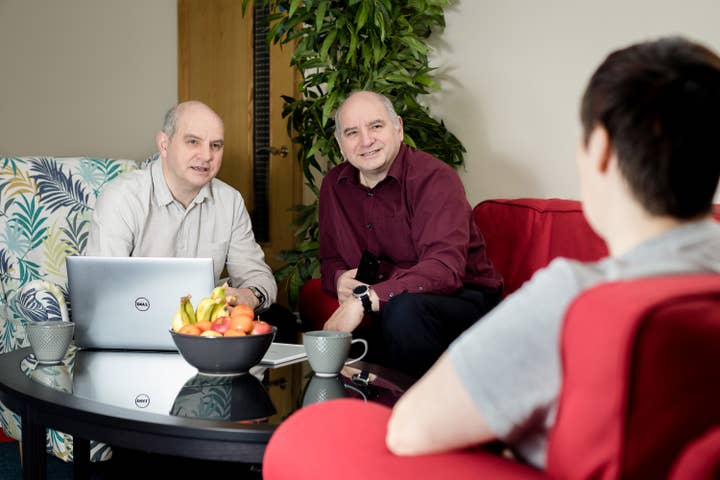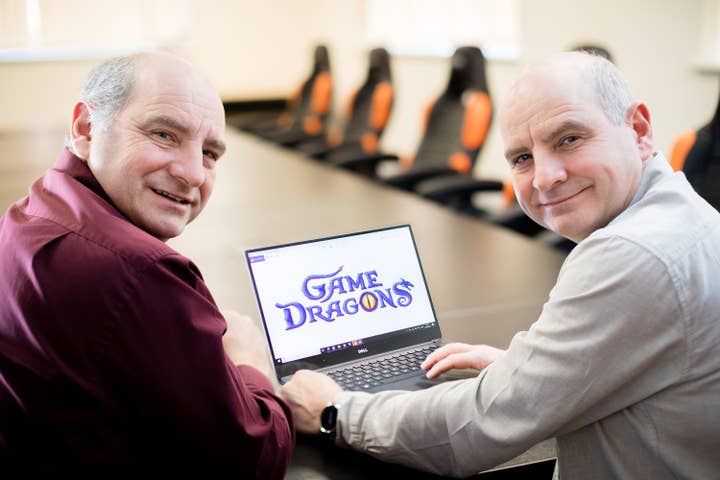Introducing Game Dragons, the Oliver Twins' new consultancy firm
Veteran developers prepare a series of advice articles for GamesIndustry.biz
Following their departure from Rebellion, the Oliver Twins have detailed their new games consultancy business Game Dragons -- and will be sharing some of their insight with GamesIndustry.biz readers.
The duo will be writing a monthly column, starting in March, offering advice on some of the most crucial aspects of running a games business.
Philip and Andrew Oliver have been prominent figures in the games industry since the 1980s, having developed the classic Dizzy games, founded and run Blitz Games Studios, and later formed Radiant Worlds.
Their move into consulting follows the sale of the latter studio to Rebellion, owned by Chris and Jason Kingsley. Since the acquisition, the Olivers have helped integrate their team of 70, oversee the studio's contribution to completing Strange Brigade (and the start of work on other projects), helped scout out new premises and assisted with the transition from Radiant Worlds to Rebellion Warwick.
"We want to make the biggest positive impact we can in the UK games industry. That's what we want our legacy to be - not just the guys that made Dizzy"
Andrew Oliver, Game Dragons
"After this it really did feel like our job was done, since the games Rebellion creates are the visions of the Kingsley brothers," Philip tells GamesIndustry.biz. "We have always been our own bosses, with aspirations and ambitions beyond being employees, even if they are really nice guys and have a very successful business.
"There is so much that we want to achieve and we feel we're in a much better position to do this now than ever before. No longer are the team, some of whom have worked for us for over 20 years, our responsibility but we know we are leaving them in safe hands. It's an opportunity to do something new and exciting."
Andrew adds: "We want to make the biggest possible positive impact we can in the UK games industry. That's what we want our legacy to be -- not just the guys that made Dizzy or wrote the most 8-bit games of anyone in the world, or employed over 600 game developers over 20 years of Blitz Games. We're incredibly proud of all of those things but we're not done yet."
Hence Game Dragons, the brothers' new business. Named in part for the pair's long-running love of dragons -- but also well aware of the connotations many will think of, linking the concept to the Dragons Den TV series -- the company is composed of just Andrew and Philip to begin with, although the latter hints: "Maybe there will be other 'dragons' in the future, too."

The aim of both the new company and the articles is to fill in knowledge gaps that all new and growing businesses face, to offer expert guidance to investors looking to invest in games, and to advise brand holders on how they might make more of their IP. It stems from their own experiences and memories of facing gaps in their own knowledge.
"We've learnt the signs to look for. Sometimes a game needs re-focusing, re-marketing, and sometimes you need to know when to walk away"
Philip Oliver, Game Dragons
"We've run several studios, and there are times when expert third party advice would have been extremely useful," says Andrew. "In fact, on many occasions we did seek the advice of consultants ourselves. Having business experts employed within a business is often too expensive, but besides being cheaper to ask the advice of a consultant, you also gain a new perspective from someone not biased by current, short-term local issues."
Naturally, given the number of small studios and start-ups out there, the Olivers are particularly keen to help indies, with Philip reminding potential clients that the brothers started out exactly the same way more than three decades ago.
"We understand what drives indies and we know what they are often missing," he says. "Over the years, we have offered advice to indies, we've lectured in universities, we've attended game jams, and often been judges too. We understand them more than they would expect, but we also know that many indies in the start-up phase won't be able to afford external consultants, so we're focusing our efforts on the developers that are looking to scale-up.
Andrew adds: "Indies often think it's all about the game. Make a great game and everything else will fall into place. [But] indies need to think about the business of making games if they want to pay the bills. Most new talented developers who want to make a living from writing games may want to do so in the safety and security of a large studio where they will learn so much. For those who really want to make it on their own, we'll open their eyes to all the things they thought weren't important."
Of course, Game Dragons will also be offering its services to larger studios. As the Olivers well know from their time at both Blitz Games Studios and Radiant Worlds, these businesses can face various internal issues that can't be discussed publicly, or even with employees in some cases. They can even suffer from circumstances beyond their control -- the unexpected cancellation of SkySaga by publisher Smilegate threatened to close Radiant Worlds.
"All businesses [face this]," says Philip. "It's nothing to be ashamed of. We've seen studios have a lucky hit, but then fail to capitalise on it. We've seen developers holding on too long to an idea that really won't go the distance. We've been there, we know and with that experience of our own, we've learnt the signs to look for. Sometimes a game needs re-focusing, re-marketing, and sometimes you need to know when to walk away."







.jpg?width=291&height=164&fit=crop&quality=80&format=jpg&auto=webp)

